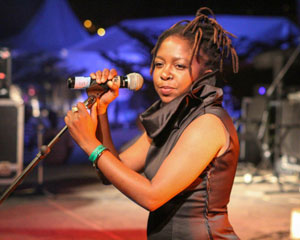
Time, which changes people, does not alter the images we have retained of them.
IN THE GROOVE WITH FRED ZINDI
As the month of July passes, the memories of Zimbabwe’s past music icons such as that of mbira queen, Chiwoniso Maraire who died on July 24 2013, remain fresh in our minds.
Chiwoniso’s death robbed the music fraternity of a sincere, creative, innovative, serious and dedicated singer and performer who was instrumental in bringing Zimbabwean music to a higher level. In her short but rich musical career, she became a national cultural heritage itself.
Although she was born in Olympia in the United States of America in 1976, she performed the most distinctive performing arts heritage of the Shona people, clearly as a disciplined and appointed custodian of a mbira heritage with a mature handling of its intricate spirit.
I first met Chiwoniso through her father, Abraham Dumisani Mararire in 1983 when she was seven years old. The thing that impressed me the most was that although she sounded American when she spoke in English, she could also speak Shona very eloquently.
In his mbira promotion workshops with cultural officers in the Ministry of Youth Sport and Culture where he worked, Dumi as her father was popularly known for advocating for Zimbabweans to take mbira as a unique cultural heritage that would be a major identifying characteristic of Zimbabwe’s music industry. He did not care whether the instrument was played by a man or a woman.
To prove his point, he taught his own daughter Chiwoniso to play the mbira. He also tried to introduce mbira music in the Methodist Church, but this effort was met with a lot of resistance. His passion for cultural heritage was not appreciated by those who had received years of western education, but he was adamant. He took out his frustration by teaching his family members to play mbira and encouraged them to take the mbira vibes wherever they could. This resulted in the emergence of Chiwoniso as a mbira player.
- Chamisa under fire over US$120K donation
- Mavhunga puts DeMbare into Chibuku quarterfinals
- Pension funds bet on Cabora Bassa oilfields
- Councils defy govt fire tender directive
Keep Reading
I further interacted with Chiwoniso at the Zimbabwe College of Music where I was teaching on the National Certificate in Music (NCM) programme.
It was there that I discovered that she was not only an accomplished mbira player, but that she also possessed a golden singing voice. When Thomas Mapfumo and Oliver Mtukudzi came to visit the college at my invitation, I asked Chiwoniso and another student, Miriam Mandipira to stand up and sing for them. They were impressed.
A year later Kanda Bongo Man from the Democratic Republic of Congo visited the college and I asked Chiwoniso and Mandipira to sing for him. He too was impressed and he asked me if he could take them to his country to become his backing singers. I asked him for payment as well as the rest of the conditions. When he became evasive, the deal was off.
Chiwoniso later joined The Storm, an Afro-beat band led by Andy Brown with whom she later had two children — Chengeto and Chiedza. After Chiwoniso split up with Andy, she formed her own mbira-based band. She started to do her own recordings and one of her early recordings, Mai Fambai Zvakanaka is dedicated to her late mother, Linda Nemarundwe.
In 1995, Chiwoniso recorded an album, Ancient Voices using both contemporary instruments and traditional African instruments such as mbira, hosho and ngoma.
In February 2006, she joined Busi Ncube, Adam Chisvo, Peter “Mashasha” Mujuru, Louis Mhlanga and many other Zimbabwean artists in an ad-hoc band called The Collaboration and recorded Hupenyu Kumusha, Life at Home, Impilo Ekhaya. The band performed at Zanzibar’s Sauti za Busara 2007 festival.
In September 2008, Chiwoniso released her fourth album and first international album in over 10 years, Rebel Woman which mirrored her personal experiences. From her own spirituality to a passerby on the street, every song in Rebel Woman was influenced by a specific event in her life.
In late 2008, Chiwoniso moved back to the United States where promoters arranged a tour of Europe and Canada for her. She returned to Zimbabwe in 2010.
It is on her return to the country in 2010 that she influenced the rise of mbira playing among girls. The Convent girls formed a mbira group at their school.
In her stage performances, Chiwoniso not only reminiscenced her late father’s passion for mbira music, but also his respect for that cultural heritage which she rejuvenated using English, in many cases, in order to accommodate a wider audience base while consistently echoing the feel of indigenous mbira sounds.
The many female Zimbabwean mbira players such as Hope Masike, Theresa Mteta, Rutendo Machiridza, Onai Mutizwa, Fungisai Zvakavapano-Mashavave, Prudence Katomeni, Diana “Mangwenya” Samkange and the Dominican Convent Mbira Group have emerged as a result of Chiwoniso’s passion. She showed them the way and taught Zimbabweans to be proud of mbira as a cultural heritage.
They have appreciated the lucrative potential in the mbira music renaissance and are a vivid representation of the repository of the benefits of Chiwoniso’s passion for mbira and her versatile adoption of that traditional music genre into a viable cultural industry product that remains emblematic of our rich cultural heritage.
It is very easy to take it for granted that Chiwoniso’s father, Mapfumo, Simon Shoko, Stella Chiweshe, the late Sekuru Gora, Mtukudzi and David Gweshe, just to mention a few, as elderly musicians, would naturally romance mbira music, but when a young person with western education becomes a robust exponent of a tradition which entrenches mbira aesthetics, we marvel at the rarity of such ingenous youth.
Chiwoniso was an embodiment of that ingenous youth that possess abundant knowledge and value of a cultural heritage bequeathed to them. She became one of the most respected custodians of the mbira music genre, on one hand and a consistent revitaliser of the cultural heritage she was safeguarding on the other hand.
Having listened to several messages of condolence in July 2013, from both the young and the old, which were conveyed on radio stations, newspapers and social media platforms, there is no doubt that all these were vivid and passionate expressions of the fact that Chiwoniso was a hero of our ongoing struggle for continued respect for and viable exploitation of our rich diversity of cultural expressions.
Cultural legends of this quality are celebrated not just for the value of what they have created but also for leaving behind works that will for generations show the way. Chiwoniso effectively played her cultural heritage promotion role. She leaves us with the task of continuing where she left. She will be in our thoughts forever. l Feedback: [email protected]











